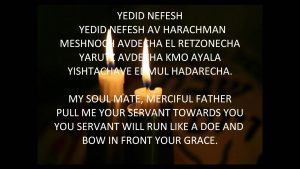Shoin, while parshas Hazeenu and its 52 pisukim, 3rd shortest parsha in the heylige Toirah, (who can blame Moishe for being a bit stingy with words; he was after all busy writing 13 Torah scrolls, and still needed time to climb up the mountain where he would pass away in accordance with the RBSO’s wishes and commands) consists mostly of a song, last shabbis in shul, there was plenty of commotion during kabolas shabbis over another song. This zemer (song) is known as ‘Yidid Nefesh’ and is sung mostly by those davening nusach Ashkenaz. It is typically sung just before kabolas shabbis.
Ober, how can a song about love for the RBSO be the cause of such controversy? What in particular caused a rabbi -not the shul rabbi- to have a shtikel outburst during the davening? Amazingly enough, though it was shabbis shuva, some also refer to it as shabbis tshuva, and though it falls always during the ‘aseres yimay tshuva’ (10 days of repentance), a time when we need to be on our best behavior lest the RBSO judge us unfavorably, and efsher even get rid of us, over in shul the behavior was not good. It was quite giferlich.
 As the ba’al tifila began singing Yidid Nefesh, this rabbi, who by chance also davens nusach ashkenaz, turned around and asked the Oisvorfer why this song was being sung? The Oisvorfer answered: why not? To which he retorted with: why not sing the star spangled banner? In other words: he was not a happy camper, if you chap. To make a long story short, he and a few others suggested that the song should not be sung. Another suggested that it be sung before Mincha and a few chasidim had their own thoughts. Bottom line: as the Oisvorfer had told his readers over and again: Yiddin don’t get along and the Moshiach, though we await him anxiously and daily, is not coming based on our behavior. Unless such behavior is mostly or wholly bad. And no matter how many chickens get choked before Yom Kippur, if you chap, and give up their lives, and no matter how many times one dips into the mikveh, or throws -symbolically- of course- his sins into the water -running or not, with and without fish, the underlying behavior needs to change. Yiddin need to be more tolerant. If the ba’al tfilila (the one conducting the service) wants to sing Yidid Nefesh, a song which according to the Mateh Ephraim, inspires one to better serve the RBSO, sing along. Or, at least shut your mouth. What good is the rabbi title if one behaves more alike a buffoon? Shoin, the Oisvorfer feels better; let’s see what’s doing in the parsha. Sadly the Oisvorfer had no time the year to mine or write new pearls. What follows then was written in 2015. Enjoy the repeat.
As the ba’al tifila began singing Yidid Nefesh, this rabbi, who by chance also davens nusach ashkenaz, turned around and asked the Oisvorfer why this song was being sung? The Oisvorfer answered: why not? To which he retorted with: why not sing the star spangled banner? In other words: he was not a happy camper, if you chap. To make a long story short, he and a few others suggested that the song should not be sung. Another suggested that it be sung before Mincha and a few chasidim had their own thoughts. Bottom line: as the Oisvorfer had told his readers over and again: Yiddin don’t get along and the Moshiach, though we await him anxiously and daily, is not coming based on our behavior. Unless such behavior is mostly or wholly bad. And no matter how many chickens get choked before Yom Kippur, if you chap, and give up their lives, and no matter how many times one dips into the mikveh, or throws -symbolically- of course- his sins into the water -running or not, with and without fish, the underlying behavior needs to change. Yiddin need to be more tolerant. If the ba’al tfilila (the one conducting the service) wants to sing Yidid Nefesh, a song which according to the Mateh Ephraim, inspires one to better serve the RBSO, sing along. Or, at least shut your mouth. What good is the rabbi title if one behaves more alike a buffoon? Shoin, the Oisvorfer feels better; let’s see what’s doing in the parsha. Sadly the Oisvorfer had no time the year to mine or write new pearls. What follows then was written in 2015. Enjoy the repeat.
Shoin, a gittin erev Shabbis koidesh. Those reading this week’s review have seemingly been spared by the RBSO. You have made it past Yom Kippur; the RBSO has decided to give you a pass and yet another chance to mend your ways. Avada we should be thankful.
Welcome to Parshas Ha’azenu and to reuse a word we mentioned just last week, the penultimate parsha. We are just about done learning the entire heylige Toirah and on Simchas Toirah we will begin all over again. Sefer Bereishis and its juicy content is mamish around the corner. Though all 613 mitzvis have previously been taught and delivered, the last two just this past week, and with them, as we have discussed many, many times, myriad business opportunities, parshas Ha’azenu gave birth to one of the biggest industries of them all. And it’s not even by way of mitzvah exploitation. And what is this gisheft? This week, as you read Moishe’s swan song delivered in one long poem, where he poetically sings his final words about the at times tumultuous relationship between RBSO and the Yiddin – especially when they become successful – we need to pay special attention to one posik of nine words that the goyim and eventually the Yiddin finally learned how to properly exploit. It took many generations and it so happens that the goyim chapped this first, the Yiddin were slow on the intake, ober they have since caught on. These nine words gave birth to the entire fitness craze which in our times, has become a multibillion dollars business gisheft.
It’s taka emes that Ha’azenu is most well known for the way the words are written in song like poetry and read in shuls with a particular cantillation, ober Ha’azenu is also known as the parsha that many yeshiva boys were required to memorize in its entirety at an early age. Why, ver veyst? Lommer lernin (let’s learn) posik tes vuv (verse 15) where Moishe warns the Yiddin not to get too fat.
Says the heylige Toirah (Devorim 32:15) azoy: “Then Yeshurun became fat and kicked…Whenever you became fat, you became obese and overwhelmed by fat.”
 Who is this person Yishurun and how fat or obese was he, and why was Moishe singling out one nebech fat and obese person? Shoin, avada we cannot believe that Moishe would make choizek (poke fun) of one single person over his weight and taka our rabbi’s have suggested that pshat is different. Though this is the first place in the entire heylige Toirah that we will encounter the word Yishurun, seemingly the word is meant to describe all the Yiddin as a nation. Es veyst zich ois (seemingly), they all became fat! And obese! What Moishe meant to say was that the Yiddin would become fat with material wealth and riches after they were to enter the land. As a result of being fat and obese, they would believe in their own success. They will abandon their faith in the RSBO’s mastery of the world. Ober the other umois-ho’oilom (goyim) chapped poshit pshat (simple meaning of the words). They decided that the heylige Toirah abhors fat and obesity. They, including early visionaries like Jake LaLane, Lucille Powers and others chapped that pshat was that people needed to exercise and trim down. Fat is not good. Shoin, eventually this gave birth to the entire fitness craze. Larger and smaller gyms, Weight Watchers, Nutri-Systems and others would follow and today we have personal trainers, fat burner pills, protein bars and other zachin. We also have hundreds of videos showing halb nakete mydlich (scantily dressed girls) to help people trim down. People believe that if they follow these videos, they too can be with those mydlich. A nechtiger-tug (never gonna happen). Veyter.
Who is this person Yishurun and how fat or obese was he, and why was Moishe singling out one nebech fat and obese person? Shoin, avada we cannot believe that Moishe would make choizek (poke fun) of one single person over his weight and taka our rabbi’s have suggested that pshat is different. Though this is the first place in the entire heylige Toirah that we will encounter the word Yishurun, seemingly the word is meant to describe all the Yiddin as a nation. Es veyst zich ois (seemingly), they all became fat! And obese! What Moishe meant to say was that the Yiddin would become fat with material wealth and riches after they were to enter the land. As a result of being fat and obese, they would believe in their own success. They will abandon their faith in the RSBO’s mastery of the world. Ober the other umois-ho’oilom (goyim) chapped poshit pshat (simple meaning of the words). They decided that the heylige Toirah abhors fat and obesity. They, including early visionaries like Jake LaLane, Lucille Powers and others chapped that pshat was that people needed to exercise and trim down. Fat is not good. Shoin, eventually this gave birth to the entire fitness craze. Larger and smaller gyms, Weight Watchers, Nutri-Systems and others would follow and today we have personal trainers, fat burner pills, protein bars and other zachin. We also have hundreds of videos showing halb nakete mydlich (scantily dressed girls) to help people trim down. People believe that if they follow these videos, they too can be with those mydlich. A nechtiger-tug (never gonna happen). Veyter.
Also, in this week’s parsha, the heylige Toirah will tell us that the Yiddin will become engaged in very sinful practices and that the RBSO will respond with very serious measures. Ober, as we have discussed in previous weeks, ultimately the RBSO after schmeising us silly, will redeem the Yiddin and bring the world to its perfect state. Asks ober that Ramban azoy: Generally, the heylige Toirah predicts that misfortune will follow only if the Yiddin act in sinful ways and promises blessings when they act properly. We never find the Toirah stating as a matter of fact that the Yiddin will definitely follow a sinful course. How is it, and why is it that Moishe makes a prediction about the Yiddin’s behavior as a fait accompli? Did Moishe have insider information?
Ober the Ramban answers his own question by quoting from the parsha. Says the heylige Toirah (Devorim 31:21) azoy: “Because I know what your evil inclination does today before I bring you into the Promised Land.” Herein lies the answer as to Moishe’s prediction with a degree of certitude. Moishe chapped that the Yiddin’s less than admirable behavior thus far was an indication of their future behavior. Imperfections in their character would inevitably become exposed in the future. The bottom line: Moishe was saying so shtark (harshly) azoy: Although no specific generation will necessarily fall into sin, sinfulness will inevitably occur at some point. Let’s remember the great power of the yetzer hora. We are not a match. An imperfect seed cannot produce a perfect tree.
And sadly Raboyseyee, Moishe’s words, though veiled at the time, taka came to pass. The history of the Yiddin taka includes times of abundance and surplus coupled mamish with a decline in morality. Shoin, let’s not forget that the person’s yetzer hora avada grows as his riches increase and as discussed over these last few weeks. He, the yetzer horo yetzer hora, is difficult to tame. Veyter…
Also in Ha’azenu, we will finally, after a few warnings from the RBSO, be saying goodbye to Moishe. The RBSO will instruct Moishe to ascend the mountain where he is to pass away mamish in the middle of the day. The RBSO will remind Moishe one more time why he was being punished and denied entry. The RBSO will remind Moishe that some time back, he, Moishe did not listen to the RBSO’s instructions about how to use his shtekin (staff). Instead, as many do ad hayoim hazeh (until today), Moishe took the shtekin in his hands, and seemingly abused it. Many do that daily trying to gain entry, if you chap. The bottom line: the RBSO has a long memory: He does not ever forget. He may look aside for a short or even long period of time, ober, one day, when you least expect it, He will remind you about such abuse.
A gittin Shabbis-
The Heylige Oisvorfer Ruv
Yitz Grossman

